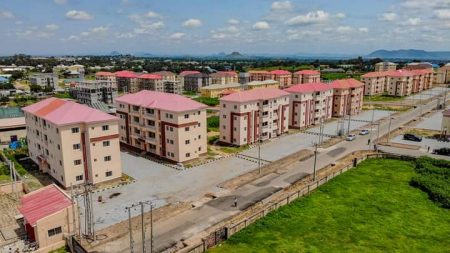It has been acknowledged that the process of obtaining land title by developers is cumbersome. Most especially for those developers that require multiple hectares that would enable the construction of housing estates with many houses to accommodate as many citizens as possible. Therefore, the size of land required for development of housing estate would be much bigger.
The FCT Mass Housing Policy is meant to ease the availability of land to such developers to contribute their quota in making houses available to all.
Thus, the introduction of the mass housing scheme was meant to enhance housing provision, and make houses available and accessible in the city to those in need. They could be civil servants, workers in private organisations, ordinary self-employed citizens of all categories and many others who reside in the city.
The high demand for accommodation by people attracted to Abuja is beyond the handling capacity of the public sector alone. However, addressing these challenges is not without costs. Because it entails the abandonment of the housing subsidy policy, a key component of the housing programme in the Abuja Master Plan. The plan recognises the low purchasing power of the ordinary citizens, hence the housing subsidy proposal.
- FCT tremor: Invest more in early warning systems, expert urges FG
- FCMB, TCF restore vision of 150,000 visually impaired Nigerians
Since the private sector is profit-oriented, while the government lacks the capacity to supply and subsidise, the abandonment of the subsidy regime became imminent with the involvement of the private sector.
However, being the major and most important stakeholders in the city’s development, who the city cannot be built nor be sustained without, the government must evolve ways of getting the types of accommodation affordable to the low-income group, as policy could be changed, but not the people, especially this category. Although, as it finally emerged, it can be truly stated, that majority of the masses or low-income earners, if not all, cannot afford the mass houses being developed for their benefit.
By the original policy of plots allocation, all citizens desirous and capable of owning houses in Abuja are entitled to only one plot allocation. But, a lot of water has gone down the bridge as time progressed; because people are now getting multiple allocations with mind-boggling sizes, due to the violations of the guidelines.
From the original model, plots sizes range from less than 800 to a maximum of 2,500 square metres, and are to contain only one to two structures depending on the density of the area. Any plot of up to 3,000 square meters is regarded as a special development plot, and would be allowed to accommodate up to three structures.
Meanwhile, the policy has pegged the sizes of the mass housing plots within the city districts at a maximum of 10 hectares, and a maximum of 20 hectares for the regional areas. Any size beyond these is an abuse of the programme. Be it as it may, all types of allocation must respect the land use and residential density as enshrined in the City plan. Thus, just as the case with the statutory allocations, a mass housing plot allocation on a high, medium or low-density area must be developed as such. These are for orderly development and meeting up with the city’s targeted population projection.
It is very important to know that there are marked differences between a statutory title and that of mass housing. A massive chunk of land would be required for the development of many houses as is the case of estates. The magnitude of the size would be far above the size for a statutory allocation to any corporate organisation.
Therefore, all mass housing allocations were not allowed to have statutory rights, but ‘Letter of Intent’ for Mass Housing development. As such, it doesn’t carry the weight of a ‘Right of Occupancy’, and cannot be processed to the level of a ‘Certificate of Occupancy’, as would be for the statutory allocation.
The amount charged by the Authority on the issuance of Letter of Intent is very little in comparison to that payable for the premium on Right of Occupancy and its accompanying annual ground rent. This is a deliberate effort in order to reduce the end cost of the product, which is the houses, in order to assist the citizens while buying the houses, and to some extent check the possibility of speculation on the title by the beneficiaries of the allocations.
The houses, when developed, are meant for sale to the citizens in need. Because the focus is on the end users, or those who bought the individual houses, as such they are the ones entitled to the issuance of Certificates of Occupancy, not the developer. Hence the limitation of the status of the developer’s title to only the Letter of Intent. Meanwhile, the Administration has since suspended the issuance of new Mass Housing allocations, due to many abuses by many so-called developers.
To be continued.

 Join Daily Trust WhatsApp Community For Quick Access To News and Happenings Around You.
Join Daily Trust WhatsApp Community For Quick Access To News and Happenings Around You.


